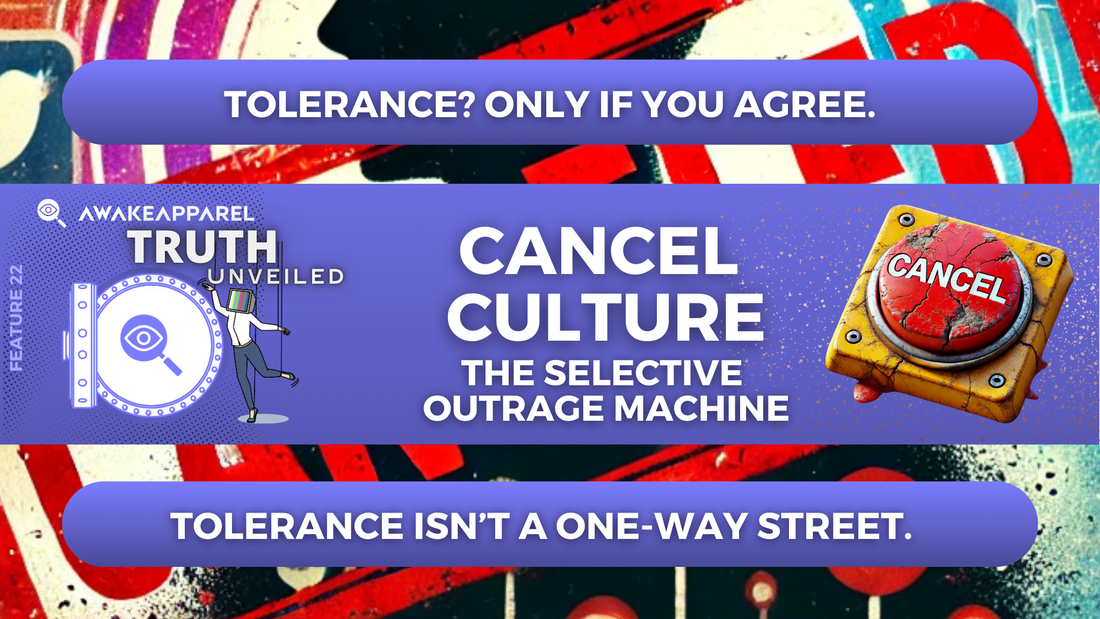
🔥 SPREAD THE TRUTH – Tap to Share!

Why does singing a song become a political crime?
Carrie Underwood performed at an inauguration, and suddenly, she’s “problematic.” Just like that, the selective outrage machine kicks into gear. But why?
Because in today’s hyper-polarized world, tolerance isn’t about acceptance—it’s about obedience.
You’re free to express yourself, as long as your opinions (or even your actions) align with the dominant narrative of the moment. Step outside the acceptable lines, even slightly, and you’re cast out.
But this isn’t just about Carrie Underwood. It’s about a pattern—one that plays out across entertainment, politics, social media, and everyday life. A system that thrives on division, emotional reactivity, and weaponized outrage.
Let’s break it down.
Echo Chambers and Selective Outrage
📌 Related Feature: [Echo Chambers: The Illusion of Consensus]
Social media algorithms don’t just reflect our biases—they reinforce and amplify them. Every time you engage with a post that supports your beliefs, the system feeds you more of the same, creating a bubble of consensus.
Now, imagine what happens when something breaks through that bubble—like a celebrity making an unexpected move.
🚨 Cue outrage.
When Carrie Underwood performed at the “wrong” event, it wasn’t just about her performance. It was a direct contradiction to the curated reality of many of her fans. Rather than re-examining their beliefs, people lashed out.
And that’s the essence of selective outrage—attacking the person instead of questioning the idea.
Cognitive Dissonance: The Root of Hypocrisy
Ever wonder why people get so irrationally angry when someone they admire does something they don’t agree with?
It’s called cognitive dissonance—that uncomfortable feeling when two conflicting beliefs exist at the same time.
🔹 “I believe my side is morally right.”
🔹 “Carrie Underwood performed for the other side.”
🔹 “She must be wrong, or I am.”
🔹 “She’s wrong.”
![]()
![]()
![]()
![]()
![]()
Rather than dealing with the discomfort of questioning their own beliefs, people rationalize the easiest way out: cancel the offender.
But here’s the kicker—this isn’t about politics. The same people who scream about freedom of expression will just as quickly demand someone be silenced when it’s inconvenient.
The outrage isn’t about principles. It’s about control.
The Rise of Performative Activism
Ever notice how fast influencers, media outlets, and celebrities jump on the outrage bandwagon?
That’s performative activism—not because they actually care, but because they need to signal to their audience that they’re on the “right” side.
Social media has turned activism into entertainment—where anger equals engagement, and engagement equals money.
🔹 The more outrage, the more clicks.
🔹 The more clicks, the more power.
🔹 The more power, the more control over the narrative.
![]()
![]()
![]()
![]()
![]()
Outrage is manufactured, monetized, and weaponized—not to change the world, but to manipulate it.
The “Us vs. Them” Mentality: A Divide-and-Conquer Tactic
📌 Related Feature: [Divide and Conquer: Why You’re Trained to Attack, Not Think]
Think about this—who actually benefits from constant division?
Not you. Not your family. Not society.
But corporations, politicians, and media giants do.
As long as people are busy fighting each other, they aren’t fighting the system.
Every time a new cancellation happens, every time an outrage cycle dominates the headlines, the real power structures stay untouched.
🔹 The surveillance state expands.
🔹 The banking elite consolidates more power.
🔹 The food and pharma industries keep poisoning people for profit.
![]()
![]()
![]()
![]()
![]()
And the public? Still arguing about a damn concert.
Wake up.
Solution: How to Break Free from the Cycle
🚀 Want to escape the outrage machine? Start here:
✅ Recognize the Patterns: When you feel triggered, ask yourself why. Are you reacting emotionally, or is there a deeper issue at play?
✅ Challenge Your Echo Chamber: Seek out perspectives that challenge your own, even if they make you uncomfortable. Real growth happens outside of comfort zones.
✅ Practice Real Tolerance: Tolerance isn’t just about accepting ideas you agree with—it’s about allowing space for all perspectives, even the ones you don’t like.
✅ Use Critical Thinking: Before jumping on the cancel bandwagon, ask who benefits from the outrage? If the answer is corporations, politicians, or media giants, congratulations—you’re being played.
![]()
![]()
![]()
![]()
![]()
Final Thoughts: Tolerance Shouldn’t Be Conditional
The next time you see a public figure get cancelled, ask yourself:
⚡ Are we promoting real unity, or are we fueling the divide?
⚡ Do we actually believe in free expression, or just when it’s convenient?
⚡ Are we thinking for ourselves, or just reacting on command?
![]()
![]()
![]()
![]()
![]()
🚨 True tolerance isn’t easy. It means accepting the uncomfortable, the unfamiliar, and the inconvenient truths.
If your “tolerance” only applies to people who agree with you, it’s not tolerance—it’s control.
🔗 Share this if you believe real tolerance means accepting differing viewpoints, not just the ones that fit the narrative.
Will you break free, or will you keep playing their game?














